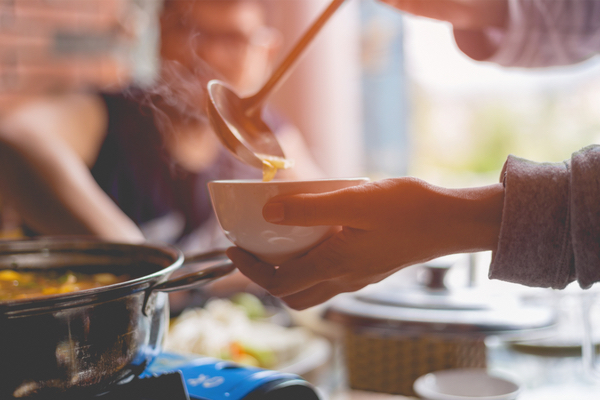We look at the best foods to nourish your body throughout the winter months according to Traditional Chinese Medicine.
As winter deepens, it’s only natural you’d want to hibernate. And fortunately, Traditional Chinese Medicine (TCM) says this is exactly what we ought to be doing.
‘Winter is the most “yin” season of the year in TCM,’ says acupuncturist Houri Alavi. ‘Yin represents dark, cold, passive, slow energy. These qualities are replicated in winter, in our bodies and also the environment, when energy – called qi in TCM – moves downwards and inwards.
‘Winter is about going within, slowing down. We instinctively want to conserve energy by resting more, going to bed earlier and getting up later.We don’t feel as active or sociable. There’s more of a desire to hibernate.’
Energy moves downwards
In TCM, the organs associated with winter are the kidneys and bladder. ‘In winter, energy goes downwards. This means it concentrates more in the lower part of the body. It’s therefore important to nourish and strengthen your kidneys, physically and energetically.’
Kidneys are considered the source of energy in the body. They are also considered the ‘root’ of all the other organs. ‘The kidneys store your life essence, or “jing”,’ says Houri.
‘There are two types of jing: inherited jing, which is what we are born with and which determines our essential constitution; and acquired jing, which is determined by lifestyle.
‘Too much stress or eating the wrong foods depletes acquired jing, but, unlike inherited jing, you can replenish it through diet, rest and relaxation. How well you age is largely down to the quality of your jing,’ says Houri.
Low libido may indicate imbalance in kidney qi
During the winter, you need to nurture your kidney energy, as this is the season when it’s most easily depleted. ‘The kidneys control sexual and reproductive functions in the body. For example, a low libido, or infertility, may indicate weakness or imbalance in kidney qi,’ says Houri.
‘The kidneys also govern bones, teeth and hair. If your hair is dry, brittle or falling out, or if you have aches and pains in your joints or problems with your teeth, this is often an external manifestation of weak kidney essence. Kidney qi also supports your lungs; this means if your kidneys are overworked and vulnerable, you’re more likely to get colds and coughs.’
When you’re in balance, you have more resilience
In TCM, the element that governs the kidneys is water, and the emotion linked to them is that of fear. ‘When the water element and kidney qi is balanced, you have the emotional will and resilience to cope with situations that might make you anxious or fearful,’ says Houri.
Fear isn’t bad in itself as it can be a warning sign. It can show you that something is not right so you can take action. However, if kidney energy is weak, you can feel fear in every situation.
‘This can manifest as chronic anxiety and panic attacks,’ says Houri. ‘By working on rebalancing the water element and kidney qi – through diet and lifestyle changes – fear and anxiety will dissipate, helping you feel calmer and better able to cope with stressful situations. A course of acupuncture can help you to rebalance, both physically and emotionally.’
Keep it warm
‘In winter, it’s beneficial to eat foods that enhance the water element, as this helps keep kidney qi in balance,’ says TCM practitioner Jonquil Westwood Pinto (brightonandhoveacupuncture.co.uk).
‘Food should be cooked gently for a longer period of time, e.g. soups, stews, roasted and baked foods. This allows food to be infused with heat and it warms the body.’
Some of the best ingredients to use in these warming soups and stews include kidney beans and all dark beans, oats, buckwheat, millet, barley, rye, turnip, winter squash, beetroot, pumpkin, cooked or roasted sweet chestnuts, Chinese mushrooms such as shitake, black rice, blackberries, stewed apples and pears. ‘Seeds, cured fish, wild game and fermented vegetables are also highly nutritious and help to build up qi. Ginger, porridge oats with cinnamon and roasted vegetables, have a gentle, warming effect,’ says Jonquil.
It’s best to steer clear of raw foods as much as possible in winter as they are more difficult for your body to break down and require a lot of energy to do so. ‘TCM guidelines recommend that most foods should be cooked in winter,’ says Greg Lampert, TCM practitioner and co-author of Chinese Dietary Wisdom (£5.99, Nutshell Press).
‘Avoid cooking methods that extract moisture, such as frying and baking. Go for dishes that add or contain moisture, such as steamed and boiled vegetables, leafy greens, casseroles, broths and soups.’
He also suggests using warming herbs and spices such as cinnamon, clove, fennel seed, turmeric, rosemary, mustard seeds, nutmeg, parsley, fenugreek and pepper. Avoid dry, processed foods such as biscuits, cakes and crisps, refined sugars, coffee and all caffeine.
Say yes to salt
The taste associated with the water element is salty. According to Chinese medicine small amounts of salty foods strengthen the kidneys. Salty foods help to regulate moisture and water in the body. The flavour moves inwards and downwards, towards the kidneys to help store strength. To benefit, choose healthy foods that have a naturally salty taste such as seafood and seaweed.
While too little salt can leave you feeling ungrounded, excess salt is damaging for the kidneys and commercial table salt is to be avoided – instead choose rock salt or pink Himalayan salt, which also contains around 84 other minerals and trace elements. Too much salt can affect the health of your bones, make muscles weak and lead to water retention.
The recommended daily guidelines are no more than 6g (one teaspoon) of salt per day for adults and children over 11 years. This includes ‘hidden’ salt in foods such as ready meals, crisps and sauces. Craving salty foods can indicate a slight kidney qi imbalance, so it’s a good idea to make changes to your diet and lifestyle to improve kidney qi (see below).
6 ways to look after yourself in winter
TCM practitioner Greg Lampert gives his advice:
Keep warm, particularly your lower back, feet and abdomen.
Avoid cold and damp environments.
Avoid excessive exercise and instead opt for regular, gentle, more relaxing movement such as yoga, chi gung and tai chi.
Make time to rest and recover, both physically and mentally.
Relax in the evening before bed (preferably screen free) and avoid late nights.
Find ways to manage stress such as meditation.
Foods and meals for colder months
Nourish and support your kidney energy this winter with the following…
BLACK AND DARK FOODS In TCM, the colour black is associated with winter and the kidneys. Black foods have a high level of antioxidants that help nourish and protect the kidneys. Go for black beans, kidney beans and black lentils.
ROASTED NUTS AND SEEDS These are packed with nutrients and have a warming effect when roasted.
BONE BROTH Nutrient-dense bone broth nourishes kidney energy. In TCM, the kidney essence governs bones, so if you’ve got good kidney qi, your bones, teeth and hair will be strong, too.
MISO AND SOY SAUCE The salty flavour helps to regulate water balance.
WHOLE GRAINS Rye, oats, quinoa, amaranth, barley and millet are all complex carbohydrates that take longer to break down, so they stabilise blood sugar, creating warmth and energy.
WINTER GREENS Try kale, chard, broccoli, chicory and cabbage.
ANIMAL-BASED PROTEIN Wild game, wild fish, seafood and good-quality organic red meat help build qi.
APPLES AND PEARS These fruits have a moistening effect and so help to ward off dehydration.
VEGETABLE SOUPS Make a hearty broth with onions, carrots, beetroot, parsnips, turnips and squash to warm your body.







